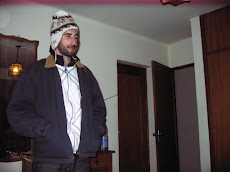POTOSÍ -- We arrived in this ancient colonial city just in time for the roadblocks to start up again, and though rumors abounded that they would end ´today or tomorrow,´ we´re still stuck here six days later. Protests, illness and other delays have stranded us in cities before. The difference here: the protesters in the central plaza have the really good dynamite. On our mine tour, we got to see them set off ammonium nitrate (I will try to upload the video later), and we can hear the same earth-shaking boom now. We´re used to the firecracker variety the students use in Sucre. In Potos í, they´ve been setting it off in the wee hours too, which makes for a lousy night´s sleep. But aside from damage to delicate nerves, no one´s been hurt. It serves mainly as an attention-getter. Most of the 15,000 miners who work on Cerro Rico, overlooking Potosí, are protesting high taxes. After 350 years of excavation, the hill that gave Spain its colonial wealth resembles Swiss cheese, but they´re still hauling tin and silver out of it. It comes back to Bolivia at inflated prices -- in $300 electronics equipment that would cost $150 in the U.S. Such is the Bolivian economy. The miners make twice the national average salary, but they have to pay ridiculous taxes --one miner told me 50 percent -- and the job usually ends in a nasty early death by silicosis. Business owners -- particularly those who cater to tourists -- have lost patience with the protests because no one can get in or out of the city, so no one is reserving hotel rooms, or buying alpaca gloves and antique textiles. Well, no one but us. We´re running a little behind schedule now, but Potosí beats other cities where we could be stranded. We´re staying in a fantastic restored colonial mansion with free Internet, TV, hot water and actual central heating. We´ve seen more of the city than we would have. We learned about every step of the silver process, from mining to smelting to minting coins, a fascinating look at the true price of money and precious metals. We have seen most of the city´s dozen or so colonial churches, including the cloistered St. Theresa convent where aristocratic families sent their second-born daughters in the 1600s and 1700s, never to see them again. And, if the protesters take the weekend off like they usually do, we´re hoping to see the bus terminal and get on with our journey.
Friday, June 20, 2008
Subscribe to:
Post Comments (Atom)


2 comments:
Will you PLEASE get out of Bolivia already and go to another country!!!! All these strikes, protests and roadblocks are making me nervous!!!! There are PLENTY of other South American countries. Go to one of them!!!
Be careful! They don't need liberal american idealists coming down there telling them what to do -- leave that to me. There are some off the world's largest salt flats to the west of the city.
Marc
Post a Comment